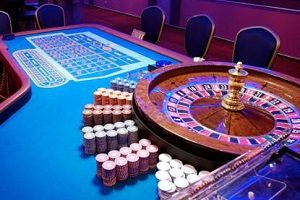Nebraska considers itself to be a limited gambling state. It allows some gambling in the form of horse racing and the lottery. There are also Native American casinos. However, the state prohibits slot machines.
A leading horse breeders and racers association and a Native American tribe want to change that. They want to expand gambling at horse tracks.
Nebraska: Where People Leave to Gamble
 Nebraska is in an interesting position. It’s one of the smallest states by population in the Midwest. However, it’s a large state in terms of area. Cornhuskers consider themselves Midwesterners, but there are areas of the state that have a Western feel. Residents enjoy gambling. Researchers estimate that people living in Nebraska spend $500 million on gambling every year. However, instead of the money going into the coffers of the state in taxes, the people spend the money elsewhere. There are many neighboring states, such as Missouri and Colorado, that have gambling.
Nebraska is in an interesting position. It’s one of the smallest states by population in the Midwest. However, it’s a large state in terms of area. Cornhuskers consider themselves Midwesterners, but there are areas of the state that have a Western feel. Residents enjoy gambling. Researchers estimate that people living in Nebraska spend $500 million on gambling every year. However, instead of the money going into the coffers of the state in taxes, the people spend the money elsewhere. There are many neighboring states, such as Missouri and Colorado, that have gambling.
Several Nebraska legislators have said they would rather keep the money in the Cornhusker State.
The Ho-Chunk Tribe and the Horseman’s Association
The Ho-Chunk/Winnebago Nation is a Native American tribe with reservations in Wisconsin and Nebraska. The Nebraska reservation is in Thurston and Dixon counties, which is on the state line with Iowa. The tribe has increasingly looked to casino gambling to increase its revenue. It uses the proceeds from gambling to fund social, health-care, and educational needs.
The horsemen’s association membership numbers in the thousands statewide. It is the primary governing body for horse racing in the state. The organization has seen a decline in the number of people who watch the races. This mimics the decline in the nationwide number. The horseman’s association also wants to improve the existing tracks in the state. In addition, it would like to build new tracks in some areas that do not have them.
The Partnership
 Members of the association and the tribe have formed a partnership to legalize gambling at the state’s horse tracks. Under their proposed bill, the race tracks would become racinos. Several Midwestern states have tried this with success. One state where racinos are popular is Ohio. The Buckeye State has seven racinos and the revenue each year gets very close to the one-billion-dollar mark. The partnership is hoping to rake in the same kind of revenue as Ohio. However, experts say the revenue in Nebraska would be lower because Ohio has a lot more residents.
Members of the association and the tribe have formed a partnership to legalize gambling at the state’s horse tracks. Under their proposed bill, the race tracks would become racinos. Several Midwestern states have tried this with success. One state where racinos are popular is Ohio. The Buckeye State has seven racinos and the revenue each year gets very close to the one-billion-dollar mark. The partnership is hoping to rake in the same kind of revenue as Ohio. However, experts say the revenue in Nebraska would be lower because Ohio has a lot more residents.
Some people doubt the legislation proposed by the tribe will pass. However, experts have said the chances the bill will pass are greater than they were in 2016. That is the last time someone proposed a change in the gambling laws. More people are in favor of gambling in the state. They believe Nebraska is losing revenue to other states, and they want to keep the revenue in Nebraska.
The partnership has suggested the state impose a single-digit tax on the revenue from the racinos (around 8 percent). This is the standard for gambling revenue taxation in the Midwest. If the proposal goes through, it will allow casino gambling in race tracks. This means race tracks will have casino gambling and slot machines. Most racinos have the casino portion in a separate location from the track.
State programs would receive some of the tax revenue from gambling. Twenty percent would go to tax relief, especially property tax relief for senior citizens. Other portions of the revenue will go into the Nebraska general fund. Legislators have proposed some of the taxed money go to education or social programs. It will be interesting to see what the legislature decides.
Disclaimer: All images are copyright to their respective owners and are used by USA Online Casino for informational purposes only.












